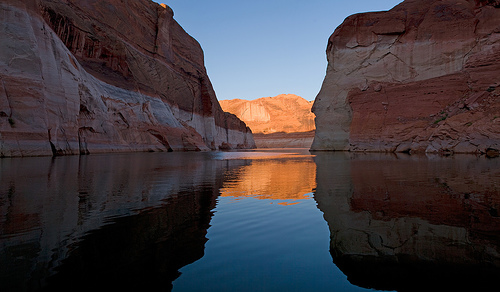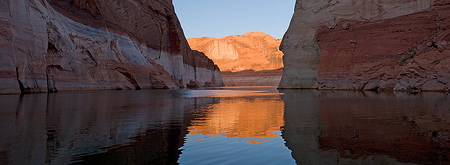 My fondest childhood memories are on a boat. Nearly every summer time was spent at a lake or reservoir swimming, skiing or just driving around. The feeling of warm air blowing my hair back as the sun gently kisses my face leaving freckled remnants behind offers me the comfort that all is right with the world. The tickle in my tummy as we fly, flounce and crash over waves makes me feel alive.
My fondest childhood memories are on a boat. Nearly every summer time was spent at a lake or reservoir swimming, skiing or just driving around. The feeling of warm air blowing my hair back as the sun gently kisses my face leaving freckled remnants behind offers me the comfort that all is right with the world. The tickle in my tummy as we fly, flounce and crash over waves makes me feel alive.
While it’s not necessarily the most eco-friendly connection with nature, boating gave me access to places I would never have seen, particularly the red rock canyons of Lake Powell. As a child I chased lizards, saw catfish and learned how to live without air conditioning in the heat of the summer months.
Later I experienced how rainfall affects the color and temperature of the lake and the importance of conserving fresh water. At night, stories in the scriptures about the innumerability of the stars in the sky became reality as I slept beneath them, able to see the Milky Way and wishing on a shooting star nearly every night.
As an adult, I learn that I’m not too important to anyone — be it a small child left with grandma or an employer hungry for an answer – to be off the cell phone grid for a few days. I experience a sense of timelessness as deep canyon walls tower on either side of me, formed one drop at a time over more years than I can even fathom.
Though new houseboats with all the conveniences of home from air conditioning to satellite TV are the rage, I prefer “roughing it” the same way I grew up.
In an essay “Knowing our Place” from her Small Wonder collection, author Barbara Kingsolver relives the places of her childhood and adulthood “where all my stories begin.” She writes of a cabin, passed from generation to generation where her family spent every summer and of window of her office in the desert home where she spent the remainder of the year. And she wonders how our increasingly urban world will affect the generation to come:
I think of the children who will never know, intuitively, that a flower is a plant’s way of making love, or what silence sounds like, or that trees breathe out what we breathe in. . . . I wonder how they will imagine the infinite when they have never seen how the stars fill a dark night sky.
She compares her convictions about our human need for place and that impact on our relationship with the earth to a religious belief or faith, even down to describing what we get from this place in terms we typically reserve for divinity:
We need to be able to taste grace and know once again that we desire it. We need to experience a landscape that is timeless, whose agenda moves at the pace of speciation and glaciers. To be surrounded by a singing, mating, howling commotion of other species, all of which love their lives as much as we do ours, and none of which could possibly care less about our economic status or our running calendar.
Where do you find place and grace?

Logan, Utah. It’s where my family is from, and where I went to college. There aren’t too many bad memories, and a lot of growth happened there. So I just feel so connected.